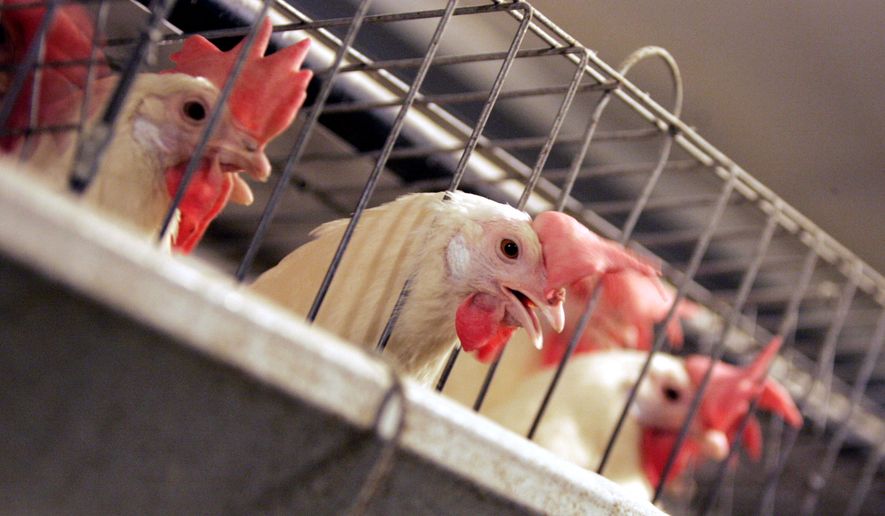Which comes first? The chicken or the consumer?
For Californians, it’s definitely the chicken. Their new law mandates that chickens be given more living room. The result: Egg prices are soaring nationwide.
But while 300 million chickens get more living space, Al Gore and friends want 320 million Americans forced into cramped living quarters — to save the planet. Animal-rights activists push to let free-range chickens wander about, but Mr. Gore and friends want to end the mobility that automobiles provide for people.
The former vice president was part of a presentation at Davos — the elitist World Economic Forum in Switzerland — which outlined a plan from the Global Commission on the Economy and Climate. For our own good, they want to push people into cities and make us stay there — and spend $90 trillion to make this happen.
We get less legroom; chickens get more drumstick room. Let’s look first at the birds, then at us humans:
California voters in 2008 approved the new law. Effective January 1, chicken farms have had to provide each caged hen at least 116 square inches, almost double the 67 square inches that now is common. Legislators added that this requirement must also be met on hens based elsewhere but whose eggs are sold in California. Sellers had to comply or pull out of the huge California market. Courts so far have been unwilling to tell California that it cannot interfere in interstate commerce.
SEE ALSO: Fed holds firm, gives no hint of rate hike
The national trade group United Egg Producers, representing the largest egg producers, supports the standard and wants it enacted on the federal level, as proposed by California Democratic Sen. Dianne Feinstein. That would assure that their competitors won’t be able to undersell them by bypassing the expense of compliance. All costs, of course, get passed on to consumers.
Egg farms typically keep hundreds of thousands of hens in climate-controlled barns, which farmers say would cost millions to enlarge. One estimate says capital costs will run $40 per layer hen. With 300 million hens, that would be $12 billion. Spread over the 50 billion eggs we consume each year, that cost is about 4 cents per egg, far more than the penny per egg predicted by the law’s advocates.
So far, price hikes have been bigger. Egg prices in California are up about 66 percent and about 35 percent elsewhere, averaging 40 percent nationwide. That’s 10 to 15 cents per egg. This might be due to shortages: Egg prices rise if farmers’ costs go up. Egg prices also go up if farmers instead quit the business, causing a drop in the egg supply.
The egg costs are not chicken feed. But neither is Al Gore’s $90 trillion agenda to remake cities all over the world. His anti-auto agenda might even bring back the horse, but then environmentalists would complain about the manure.
In 1992, Mr. Gore wrote in “Earth in the Balance” about his determination to eliminate the internal combustion engine within 25 years. Now he and Davos friends have outlined their plan to do so.
The just-issued report from the Global Commission on the Economy and Climate is full of condemnations of automobiles and the roads on which they’re driven. The authors blame economic and climate problems on “unmanaged unstructured global urban expansion,” fueled by “motorization,” which is their pet term for private automobiles.
SEE ALSO: FDIC attempts to end Operation Choke Point with letter, action
They also blame stagnant economic growth on traffic congestion. Their solution — ban the traffic.
To them, automobiles rob economic growth not only due to pollution, but also due to injuries in accidents. It galls then that people choose to pay for cars and roads instead of asking for mass transit. Rather than praising autos as the Great American Freedom Machine, the report complains that people choose to live in suburbs and spend money there instead of in the inner cities.
The report cites claims that the U.S. has an annual $1 trillion shortfall in infrastructure investment. They pick an obvious solution: Quit building roads and you abolish the shortfall.
Their proposal says communities should yield control of growth to regional, national and global governing bodies. These would create bans on developments that don’t attain a minimum level of population density. So either a housing unit packs people in like sardines (or chickens) or it doesn’t get a building permit. They don’t address what happens if tenants move out and the density drops. Must the unit evict those who remain?
The globalists say we need “compact, connected and coordinated cities.” That description sounds a lot like the chicken cages that activists condemn as inhumane.
Add chicken rights to regulators’ abuse of the Endangered Species Act, and you see that America is on the verge of giving animals more special rights protection than people get. It’s scary when activists agitate to coop up the people but allow the chickens free range. They must think that freedom is for the birds.
• Ernest Istook is a former Republican congressman from Oklahoma. Get his free email newsletter by signing up at eepurl.com/JPojD.




Please read our comment policy before commenting.